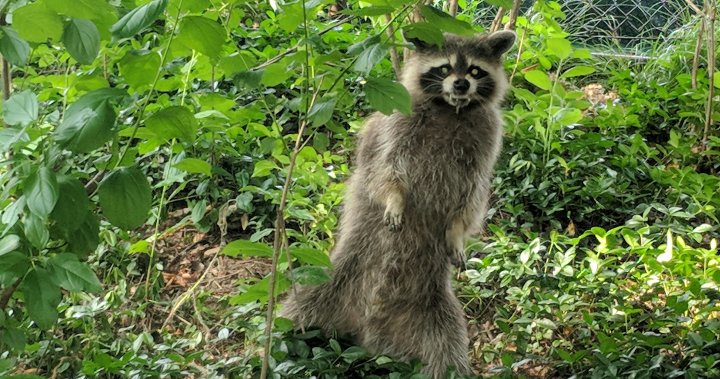The canine distemper virus (CDV) has been causing outbreaks in raccoons across Canada, turning them into what appear to be “zombies” or possessed creatures. The virus makes raccoons behave strangely, approaching humans without fear, baring their teeth, and growling. Raccoons infected with CDV may also be active during the daytime and exhibit signs of disorientation, such as toppling over. The virus is lethal for raccoons and can lead to aggressive behavior if they feel cornered. Experts advise against approaching or relocating infected raccoons, as this can spread the virus to other animals.
Nathalie Karvonen, the executive director of the Toronto Wildlife Centre animal hospital, stated that the distemper virus has been prevalent in Toronto for 15-20 years, initially spread by pets. While pets are typically vaccinated against the virus, there is no current vaccination campaign for raccoons as humans cannot contract CDV. This lack of vaccination options for raccoons leaves them vulnerable to the effects of the virus, resulting in increased numbers of sick and injured raccoons being reported and serviced in Toronto. The virus is more likely to spread in warmer weather when animals congregate and come into contact with each other.
In response to an increase in rabies cases, Quebec carried out a vaccination campaign in late April to protect against the virus spreading from Vermont, which is located near the Quebec border. The province distributed 46,200 vaccine baits, designed to attract raccoons and prevent the spread of the disease. In Ontario, rabies cases among raccoons have decreased significantly, thanks to an annual vaccination program. If a person is scratched by a raccoon, medical attention should be sought immediately, as a rabies shot may be necessary. Despite rare instances of raccoons attacking humans, experts strongly advise against trying to domesticate or train them as they can become reliant on humans for food and unafraid of people.
The symptoms of CDV can be similar to rabies, which has been a concern in Quebec and other regions. While rabies cases have decreased in Ontario, there is still a risk of transmission to humans through scratches or bites. It is important to be cautious around wild animals and seek medical attention if any contact occurs. Toronto Animal Services has reported a significant increase in service calls for sick and injured raccoons, as well as an uptick in raccoons being hit by cars. The agency attributes this increase to warmer weather, causing animals to interact more and spread the virus more rapidly.
Overall, the presence of canine distemper virus in raccoons poses a threat to both the animals themselves and potentially to humans as well. It is essential to avoid contact with infected raccoons and to report sightings to local authorities for proper handling. Vaccination campaigns for rabies and other diseases are crucial in preventing further outbreaks and protecting wildlife populations. It is also important for individuals to be aware of the risks associated with interacting with wild animals and to seek medical attention promptly if any contact or scratches occur. Experts emphasize the importance of respecting wildlife and not attempting to domesticate or train raccoons, as this can lead to dangerous situations for both the animals and humans involved.













